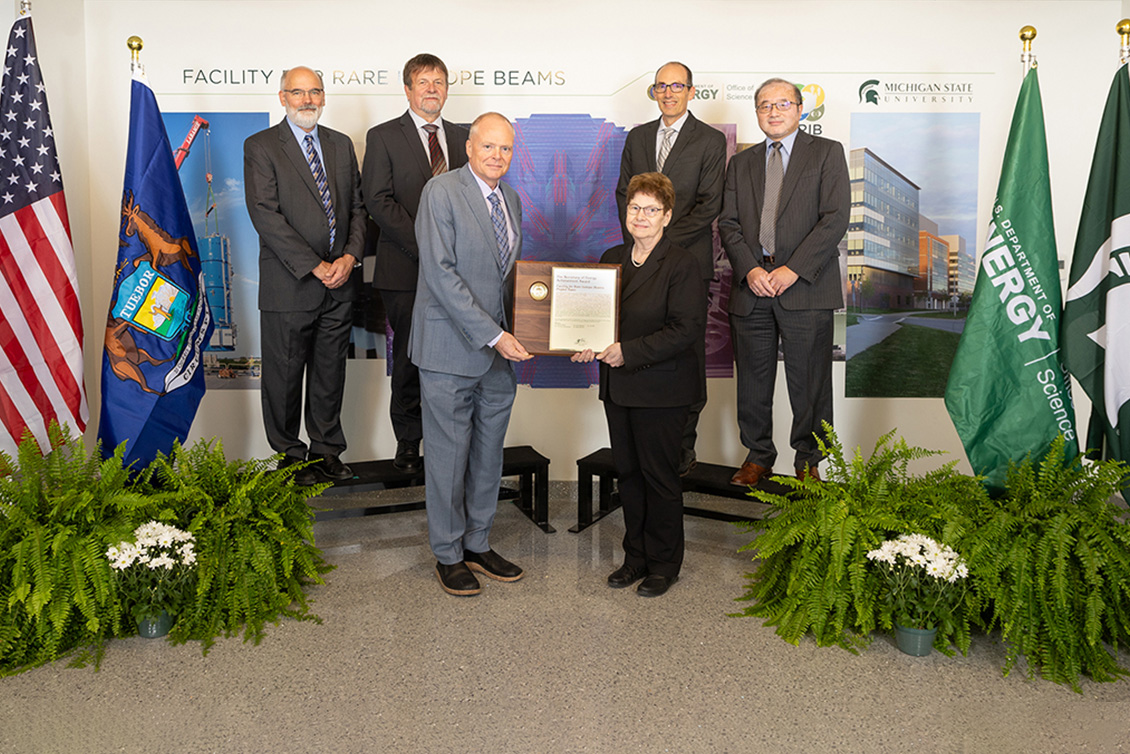U.S. Department of Energy Office of Science presents FRIB with Secretary of Energy’s Achievement Award

Share this article:
Share this article:
East Lansing, Mich. – Today, Dr. Linda L. Horton, U.S. Department of Energy Office of Science (DOE-SC) Associate Deputy Director for Science Programs and acting Associate Director of the DOE-SC Office of Nuclear Physics (DOE-SC NP), presented a DOE Secretary of Energy Achievement Award—DOE’s highest recognition for team achievements—to the Facility for Rare Isotope Beams (FRIB) Project team. The project team designed and established FRIB—on budget and ahead of schedule. Michigan State University now operates FRIB as a user facility for DOE-SC, with financial support from and furthering the mission of DOE-SC NP.
DOE-SC nominated the FRIB Project team for the award, which was announced at the annual Secretary’s Honor Awards ceremony held 20 February. The Secretary’s Honor Awards are given every year to individuals and teams whose service has gone above and beyond expectations and for contributions having lasting impacts on both DOE and the United States. These awards are among the highest forms of internal, non-monetary recognition DOE federal and contractor employees can receive.
“I’m honored to present this award to the FRIB Project team for their incredible efforts delivering FRIB as a user facility for the DOE-SC Office of Nuclear Physics. Completing the 14-year project on budget and ahead of schedule is the product of their exemplary project management, steadfast oversight, and remarkable perseverance,” said Horton. “This new Office of Science user facility supports a vibrant community of 1,800 scientists, enabling new avenues for research and technical advancements, forwarding several DOE missions, and advancing the nation’s science and technology leadership and competitiveness. Congratulations to the FRIB Project team!”
FRIB Laboratory Director Thomas Glasmacher, former Project Manager and Deputy Laboratory Director Paul Mantica, former Scientific Director Brad Sherrill, Experimental Systems Director Georg Bollen, and Accelerator Systems Division Director Jie Wei accepted the award on behalf of the FRIB Project team.
“This recognition reflects the collective efforts of the entire FRIB Project team and the collaboration with the DOE-SC NP and MSU; without their dedication and support, FRIB would not exist. As a U.S. Department of Energy Office of Science user facility, we take great pride in enabling scientists to make forefront discoveries,” said FRIB Laboratory Director Thomas Glasmacher. “We are truly honored to receive this recognition and extend our sincere gratitude to the U.S. government and American taxpayers for their continued support, which enables us to operate FRIB in service to our nation.”
FRIB, which began construction in May 2009, was completed in January 2022 and opened in May 2022. FRIB has provided over 270 rare isotope beams since user operations began in May 2022, and has enhanced capabilities to become the world's most powerful heavy-ion accelerator.
Training the next generation of scientists at a world-unique, campus-based DOE-SC user facility is a unique experience and top priority at FRIB. MSU’s nuclear physics graduate program continues to be top-ranked in the nation for 29 years. Over the past five years, MSU awarded 15% of nuclear science doctorate degrees in the U.S. Core capabilities developed in establishing and operating FRIB, like superconducting radio frequency technology and helium liquefaction, transfer to industries and applications. The DOE Office of Science's core investment in fundamental rare isotope research and FRIB user facility operation enables additional significant and synergistic activities in service to the nation. Isotope harvesting will make use of extra, unused isotopes in multiple additional fields of study, like medicine, biochemistry, materials science, and more. Additionally, FRIB is being leveraged to address a national need for chip testing capacity. Programs in collaboration with MSU’s College of Natural Science and College of Engineering capitalize on the unique opportunity having FRIB on campus affords to train the workforce and establish MSU's leadership in critical fields of national interest. Programs include the Accelerator Science and Traineeship Program, the Space Electronics Initiative, and MSU Cryogenic Initiative.
Michigan State University (MSU) operates the Facility for Rare Isotope Beams (FRIB) as a user facility for the U.S. Department of Energy Office of Science (DOE-SC), with financial support from and furthering the mission of the DOE-SC Office of Nuclear Physics. Hosting the most powerful heavy-ion accelerator, FRIB enables scientists to make discoveries about the properties of rare isotopes in order to better understand the physics of nuclei, nuclear astrophysics, fundamental interactions, and applications for society, including in medicine, homeland security, and industry.
The U.S. Department of Energy Office of Science is the single largest supporter of basic research in the physical sciences in the United States and is working to address some of today’s most pressing challenges. For more information, visit energy.gov/science.

